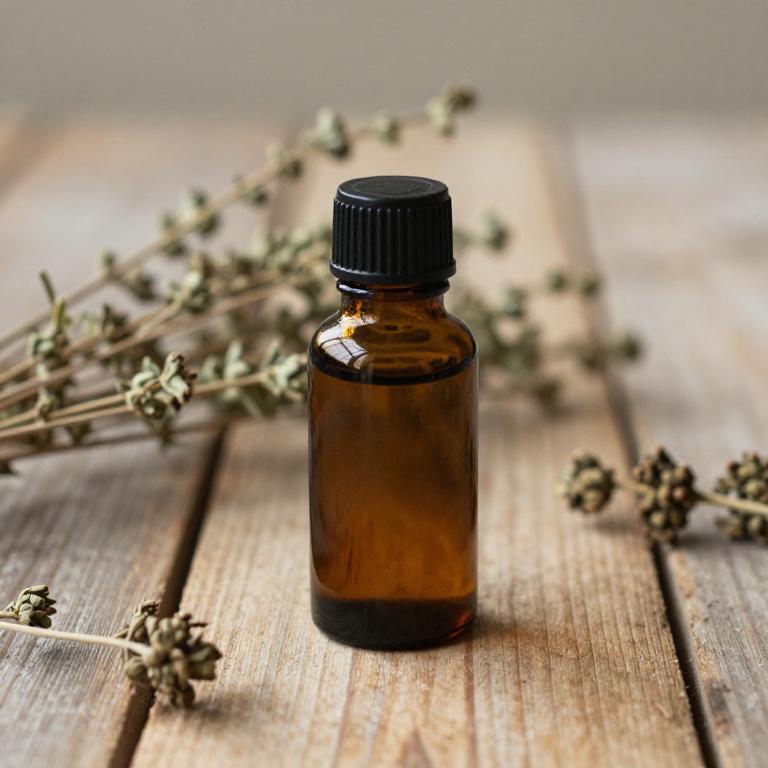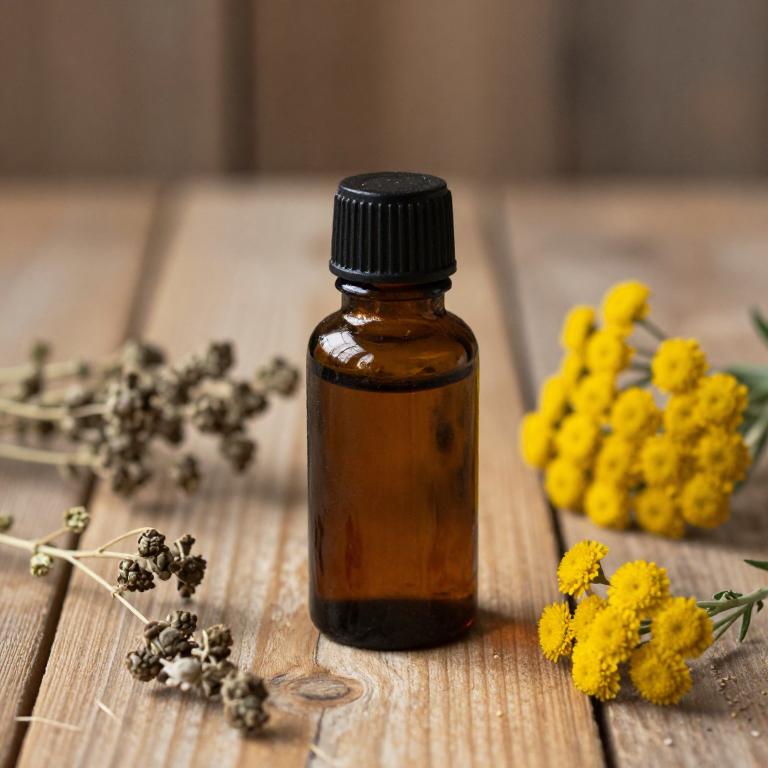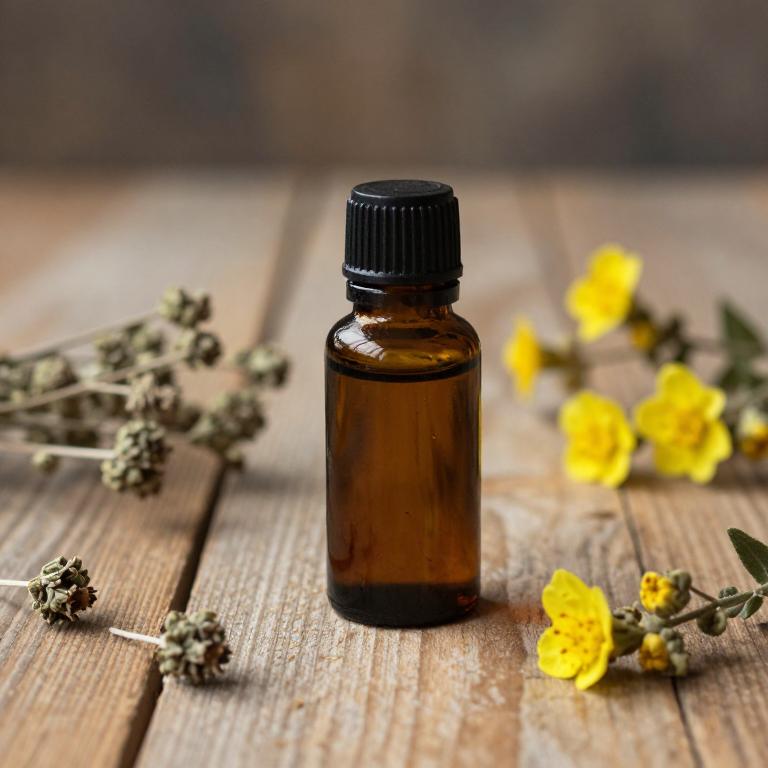10 Best Herbal Essential Oils For Swollen Gums

Herbal essential oils, such as tea tree, peppermint, and eucalyptus, have been traditionally used for their anti-inflammatory and antimicrobial properties, making them beneficial for soothing swollen gums.
These oils can help reduce gum inflammation and combat bacterial infections that contribute to gingivitis and periodontal disease. When diluted properly with a carrier oil, they can be applied directly to the gums or used in mouth rinses for a natural and effective approach to oral care. However, it is important to use them cautiously, as undiluted essential oils may cause irritation or allergic reactions.
Incorporating these oils into a regular dental hygiene routine can support overall gum health when used in conjunction with proper brushing and flossing.
Table of Contents
- 1. Salvia (Salvia officinalis)
- 2. Oregano (Origanum vulgare)
- 3. Ceylon cinnamon (Cinnamomum zeylanicum)
- 4. Melaleuca (Melaleuca alternifolia)
- 5. Eucalyptus (Eucalyptus globulus)
- 6. Rosemary (Rosmarinus officinalis)
- 7. Thyme (Thymus vulgaris)
- 8. English lavender (Lavandula angustifolia)
- 9. Yarrow (Achillea millefolium)
- 10. Common teucrium (Teucrium marum)
1. Salvia (Salvia officinalis)

Salvia officinalis, commonly known as sage, contains essential oils that have been traditionally used for their anti-inflammatory and antimicrobial properties.
These essential oils, particularly rich in compounds like thujone and cineole, can help reduce inflammation and infection in the gums, making them beneficial for individuals suffering from swollen gums. When used in diluted form, sage essential oil can be applied topically to the affected areas to soothe irritation and promote healing. However, it is important to consult with a healthcare professional before using essential oils, as they can be potent and may cause adverse reactions if not used properly.
Overall, salvia officinalis essential oils offer a natural alternative for managing gum inflammation when used safely and in conjunction with proper oral hygiene practices.
2. Oregano (Origanum vulgare)

Origanum vulgare, commonly known as oregano, is a versatile herb whose essential oil has been traditionally used for its antimicrobial and anti-inflammatory properties.
The essential oil of oregano contains compounds like carvacrol and thymol, which are known to inhibit the growth of bacteria that can contribute to gum inflammation and infection. When applied topically or used in aromatherapy, oregano essential oil may help reduce swelling and discomfort associated with gingivitis and periodontal disease. However, it should be diluted properly before use to avoid skin irritation, and it is advisable to consult a healthcare professional before incorporating it into a dental care routine.
Overall, oregano essential oil can be a valuable natural remedy for supporting gum health when used safely and appropriately.
3. Ceylon cinnamon (Cinnamomum zeylanicum)

Cinnamomum zeylanicum, commonly known as cinnamon bark, produces a powerful essential oil that has been traditionally used for its antimicrobial and anti-inflammatory properties.
This essential oil contains compounds like cinnamaldehyde, which can help reduce bacterial growth and inflammation in the mouth, making it beneficial for treating swollen gums. When diluted properly, cinnamon essential oil can be applied topically to the affected areas to soothe irritation and promote healing. However, it should never be used undiluted, as it can cause skin irritation or oral sensitivities.
While it may offer natural relief for gum inflammation, it is advisable to consult a healthcare professional before using it as a treatment for persistent or severe gum issues.
4. Melaleuca (Melaleuca alternifolia)

Melaleuca alternifolia, commonly known as tea tree oil, is a popular essential oil derived from the leaves of the Melaleuca alternifolia plant, native to Australia.
It is renowned for its potent antimicrobial properties, which make it effective in combating bacterial infections, including those that contribute to gum inflammation and swelling. When diluted properly, tea tree oil can be applied topically to the gums to help reduce redness, swelling, and infection. Its natural antiseptic qualities may also help promote healing and prevent further gum damage.
However, it is important to use it in a properly diluted form to avoid skin irritation, as it is a concentrated essential oil and should never be applied directly to the skin or gums without dilution.
5. Eucalyptus (Eucalyptus globulus)

Eucalyptus globulus, commonly known as Australian eucalyptus, is a popular source of herbal essential oils often used for its antimicrobial and anti-inflammatory properties.
When applied topically, eucalyptus globulus essential oil can help reduce inflammation and swelling in the gums, making it a useful natural remedy for gum issues. However, it should always be diluted with a carrier oil to avoid skin irritation and ensure safe application. Its refreshing scent also provides a calming effect, which can help ease discomfort associated with swollen gums.
While it may offer relief, it is important to consult a dentist for proper diagnosis and treatment of underlying gum conditions.
6. Rosemary (Rosmarinus officinalis)

Rosmarinus officinalis, commonly known as rosemary, produces an essential oil that has been traditionally used for its anti-inflammatory and antimicrobial properties.
This essential oil can help reduce inflammation and infection in the gums, making it beneficial for treating swollen gums. When diluted properly, rosemary essential oil can be applied topically to the affected areas to soothe irritation and promote healing. Its ability to improve circulation may also aid in reducing swelling and supporting gum health.
However, it is important to use it cautiously and consult with a healthcare professional before incorporating it into a dental care routine.
7. Thyme (Thymus vulgaris)

Thymus vulgaris, commonly known as thyme, is a medicinal plant whose essential oil has been traditionally used for its antimicrobial and anti-inflammatory properties.
The essential oil of thymus vulgaris contains compounds such as thymol and carvacrol, which are known to combat bacterial infections and reduce inflammation in the oral cavity. When applied topically or used in diluted form, thyme essential oil can help alleviate symptoms of swollen gums by reducing infection and soothing irritation. It is often recommended as a natural remedy for gingivitis and other gum-related issues due to its potent antibacterial effects.
However, it is important to use thyme essential oil with caution, as it can be irritating to sensitive tissues and should always be diluted before application.
8. English lavender (Lavandula angustifolia)

Lavandula angustifolia, commonly known as English lavender, is widely recognized for its calming properties and therapeutic benefits, including its potential to alleviate symptoms of swollen gums.
The essential oil derived from this plant contains compounds like linalool and linalyl acetate, which have anti-inflammatory and antimicrobial properties that can help reduce gum inflammation and inhibit bacterial growth. When used in diluted form, lavender essential oil can be applied topically to the gums to soothe irritation and promote healing. It is often recommended as a natural alternative to conventional treatments for mild cases of gingivitis.
However, it is important to consult a healthcare professional before using essential oils, especially if you have underlying health conditions or are pregnant.
9. Yarrow (Achillea millefolium)

Achillea millefolium, commonly known as yarrow, contains essential oils that have been traditionally used for their anti-inflammatory and astringent properties, making them beneficial for treating swollen gums.
The essential oil of yarrow is rich in compounds such as chamazulene and bisabolol, which help reduce inflammation and soothe irritated gum tissues. When applied topically, these oils can help alleviate gum swelling and promote healing by tightening the gum tissue and reducing bacterial growth. However, it is important to dilute the essential oil properly before applying it to the gums to avoid irritation.
While yarrow essential oil may offer natural relief for gum issues, it should be used as a complementary therapy under the guidance of a healthcare professional.
10. Common teucrium (Teucrium marum)

Teucrium marum, also known as germander, contains essential oils that have been traditionally used for their anti-inflammatory and antimicrobial properties, making them potentially beneficial for swollen gums.
The essential oils derived from this plant may help reduce gum inflammation by inhibiting the growth of harmful bacteria that contribute to periodontal disease. These oils can be used in diluted form as a mouth rinse or applied topically to the affected areas for localized relief. However, it is important to consult with a healthcare professional before using these oils, as they may interact with other medications or cause irritation if not properly diluted.
While preliminary research suggests potential benefits, more clinical studies are needed to fully understand their efficacy and safety for oral health.